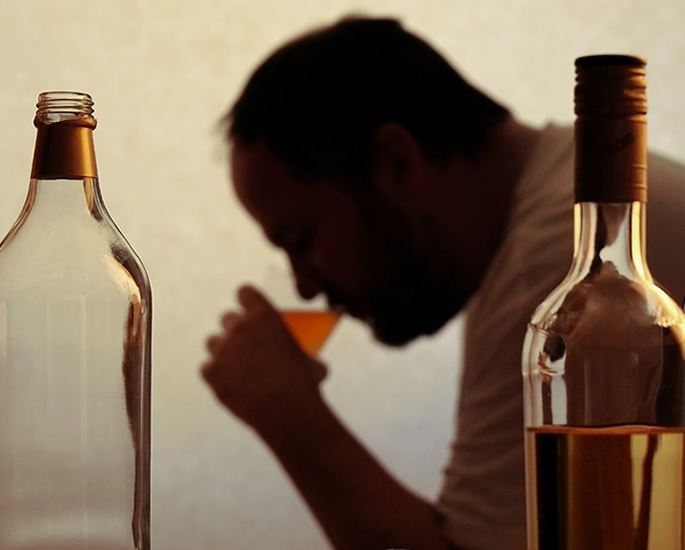The shame attached to smoking does not apply to being wasted on alcohol.
The impact of alcohol abuse can be devastating on any marriage regardless of race or ethnicity. In a Desi marriage, however, it can be even more brutal.
Perhaps the main reason for this is how South Asian society has conditioned women’s beliefs. In the past, Desi women believed that a marriage could not break down.
Once you wed, it was for life. Of course, these views have changed considerably in over the years. Those of an older generation, however, still find themselves trapped.
The consumption of alcohol is readily and commonly accepted within the wider British Asian communities. Yet, few acknowledge the pain and damage it causes.
Desi men like to drink is a well-known fact. However, in the Punjabi community, the shame attached to smoking or drug-taking does not apply to the abuse and destruction caused by being wasted on alcohol.
It is also true that the tables have somewhat turned. British Asian women can enjoy a drink now too without being labelled, though not all are accepting of this.
Do we ever stop to consider that the abuser could also be a woman? In the past, it’s always been the man that drinks but not so now.
The younger generation of British Asians embrace the culture of drinking and inequality doesn’t come into it. In fact, it’s not uncommon to find Desi men and women drinking together in a pub.
There is less cynicism and judgment although the older generation will still raise an eyebrow or two. We take a closer look at how alcohol abuse can impact on a Desi marriage.
These are real-life stories but names have been changed to protect identities.
Amrita
Amrita is a 36-year-old British Asian woman and a divorcee. She was married to Jag for ten years before deciding that she had had enough.
She speaks about Jag in bitter tones:
“Jag had a promising career. He was in the police force and loved it. The money was good and we were doing really well as a family.
“We were really happy but nothing good ever lasts forever. Jag started staying out late every night and wouldn’t come home from work on time.
“We didn’t talk anymore and he lost interest in me and our baby girl. He had doted on her and would moan if he had to work late.
Amrita has been on her own for three years now. She says that living with Jag had become impossible and, in the end, she decided to walk away with their daughter.
His persistent drinking and absence from home gave Amrita the ammunition she needed to file for divorce.
She says:
“He didn’t know how lucky he was really. His employers were good to him and looked out for him. They gave him a chance to stop and change his ways.
“Jag though, somewhere along the way he lost himself. He didn’t care about the job anymore either.
“In the end, they had to let him go as alcohol abuse was having an impact on his ability to fulfil his role”.
Jag hid beer cans in his locker at work and would drink during his shift. His colleagues often found him slumped at his desk. His excuse was that the baby had kept him awake at night.
“After he was dismissed from work, he didn’t come home much either so I don’t know where he went. At first, I thought he was having an affair but was wrong about that”.
Amrita looks back and even manages a laugh:
“I can’t believe he did that – I mean risk his whole career and family for the sake of a drink.”
“What I will say, however, is that he was never violent”.
She tells us that Jag would get drunk, rant, and rave about anything and everything and then go to sleep. The neighbours often asked if she was okay after all the loud shouting and banging.
Jag now lives at home with his parents and sees his daughter once a week. He is still drinking and still unemployed. He has asked for help to quit which is a good sign.
We ask Amrita if she would ever consider taking him back:
“No, absolutely and categorically no. I couldn’t do that because, as far as I’m concerned, once an alcoholic – always an alcoholic.
“He might stop for a bit but for how long? The fear will always be there and I can’t live like that. I wish him well and there are no hard feelings but there will never be a reunion”.
Although Amrita had the courage, and the backing of her family, to divorce her husband, there are many women who don’t. They suffer in silence and bear the burden of an unhappy, often violent, and unfulfilled relationship.
However, as previously mentioned, it is not only men who are guilty of alcohol abuse. Our next story concerns a relationship riddled with alcohol abuse where the wife is at fault.
Tanvir
Tanvir is 32 years of age. He is a British Asian male currently living with his parents. He tells us the reasons behind the destruction that caused his family to fall apart.
“I met my wife when we were at college together. We went on to go to university and drifted apart for a bit. We found each other again through friends and social media.
“At this time, we were both 22 years old. We enjoyed going out and having a good time. I couldn’t see any problem with that. She drank and so did I.
“I knew I wanted to be with her forever – sounds a bit cliche now – but that’s how it was. I did tell her that I didn’t like her drinking quite so much and she said she would calm it down”.
To cut a long story short, Tanvir proposed and they were married soon after. Looking back to that time he says:
“We were so young. Our parents helped us buy a house and we soon became parents. Our little boy was born within two years.
“The drinking did calm down but I didn’t know what was yet to come. I stopped drinking altogether because I didn’t see the point anymore”.
He recalls with sadness:
“She came home from work really late one night completely pissed. I put it down to a one-off as she stumbled upstairs to bed.
“I questioned her about it in the morning and she laughed it off. That really wound me up. ‘It won’t happen again,’ she said matter-of-factly.
“But it did; night after night. We started rowing and the arguments got worse. She never listened to anything I had to say. When I would start to speak she would start shouting even louder to drown me out”.
Tanvir says the impact of alcohol abuse was extremely negative and led to her raising a hand on their son. He is distraught and visibly upset as he says:
“She overstepped the mark then. That was it.
“He was only five and all he had wanted was a cuddle from his mum. Instead, she pushed him and he fell.”
“She was so drunk and the language became more and more abusive. I don’t know what I did wrong but she called me by every swear word she could think of.
“I told her I was going to leave and she just said, ‘go then, see if I care’. There was no fixing things and I knew the violence would only get worse. I couldn’t risk any harm to my boy”.
Tanvir packed a few things, took his son, and walked away. He says he had no choice, adding:
“She chose to ruin her life so I left her to it. I wish things could have been different but she wasn’t willing to get help. I would have helped her if she had wanted it”.
He doesn’t regret leaving his wife. He explains that the relationship had become toxic and damaged beyond repair. She was neither a mother nor a wife:
“A mother should be someone who would do anything for her kids.
“She didn’t even know that her son existed let alone be a mother to him. She just gave up and there was no motherly anything about her”.
Tanvir admits he feels sorry for her but there wasn’t anything he could have done. His son had to come first.
Kajal
Kajal is 47-years-old and a widow. Her story tells of the sadness and pain that alcohol abuse can bring to the whole family.
She tells us:
“I was married in India, but it was my own choice. I had done some really stupid stuff when I was younger and paid the price for it when I wanted to get married.
“As you would expect, once it got around that I had left home, people didn’t want to know. Rishtas would come and then no-one would turn up on the day”.
Kajal, not wishing to bring any more shame to the family, decided to go to India to get married. There she met Ravi and they were engaged and then wed.
This was a very emotional time, as she recalls:
“It all happened really quickly and I didn’t know anything about him except that he looked good. He drank as most men do and I didn’t think anything of it.
“We came back to the UK and made a life for ourselves here. We had a baby and then another and things were great. He learned a new trade and we were fine.
“Everyone loved Ravi because he was basically a really nice person. You couldn’t really fault him but then he just started to drink more and more”.
Kajal confesses that she didn’t see it coming or being a problem until it actually was. Ravi started to bring ‘friends’ to the house and they would just sit and drink all night.
She is quite emotional when talking about this and says that the impact of alcohol abuse on her life was traumatic. She says:
“I was very sad and angry at the same time. My family stood by me and helped with childcare and other things. They kept saying he would stop.
“I felt neglected and alone. Your family can’t take the place of your husband and I had no-one to help me during the long nights.
“Ravi’s drinking was no longer a social thing. He drunk to get drunk. I was trapped in a nightmare which had been a dream to begin with”.
Consequently, Ravi lost his job too as he couldn’t stay sober even at work. He was even stupid enough to drive whilst drunk and this resulted in disqualification from driving.
He turned from being a social drinker to an alcoholic, going from one rehab clinic to another, but nothing changed.
Kajal says that:
“I will never understand what it was that made him want to be in an unconscious state for days on end. We had everything and had been so happy.
“What also upsets me and makes me really angry is people asking me why he drinks so much. I think they thought that it was my fault in some way.
“Maybe they thought I wasn’t a good wife or was having an affair. I don’t know but hell, I wish I did know. Do you think I chose that life?”
She goes on to explain that coming to this country had been a big deal for him as he had left everything behind. He never said it but she felt he was homesick.
Perhaps, she thinks, he found it difficult to adjust to life in the UK. Whatever it was, she spent most of her life looking over her shoulder.
Kajal looks sad when she says:
“I hated him as much as I loved him. He was in my life, but I was alone at the same time. Alcohol took his life when he was diagnosed with cirrhosis of the liver.
“He threw away his life but I don’t resent him. I know he couldn’t help it. I defy anyone to tell me that it’s easy to stop drinking if you want.
“Alcoholism is an illness; it is not just an addiction. The impact of alcohol abuse on a marriage can be devastating for all those involved”.
Ravi passed away when he was just forty; a life destroyed by an addiction that is not always taken seriously in desi communities. He left behind a wife, a son and a daughter.
Dipti
Dipti is the middle child of three siblings; she is twenty-four and lives at home. Her older sister is married and she has a younger brother also at home.
Her story is somewhat different in that it is not her relationship that has suffered as a result of the impact of alcohol abuse.
She talks to us and says:
“It’s my dad. He makes our lives hell and mum won’t leave him. His drinking became a problem when I was about sixteen.
“He used to drink before then too but he could control it. Now, it’s just like living a nightmare. Mum works and keeps everything afloat.
“Dad – well, he might as well not be here for all it’s worth. Mum always comes home to find him either slumped on the sofa or passed out on the floor”.
Dipti says that her brother doesn’t care anymore and just steps over their dad as if he was an object lying on the floor.
She is close to tears when she talks about her mum. Her life, she says, consists of wiping up sick and urine because her dad cannot control any of his bodily functions.
She speaks fondly of her mum:
“Mum is my hero. She has gone through a whole load of crap and still carries on. We all tell her to leave dad but she says she can’t.
“He has given up on life and I can’t remember the last time I had a conversation with him. He is never sober enough and I miss him terribly.
“Mum’s put her life on hold for him and he couldn’t care less. It’s like looking after a child but even more tiring. We don’t trust him so lock him in the house when we go out”.
Dipti explains that her dad cannot have any money on him at all and they have taken all his cards off him. She says that, despite this, he still gets drunk.
She is at her wit’s end as she says:
“Dad is in and out of hospitals so many times. Once I came home early and found him in bed. He had vomited blood and sick and could have choked on it.
“I was absolutely livid but he’s still my dad. The ambulance took him to hospital and he was saved – again. We have tried everything to help him stop but he can’t.
“Mum cries herself to sleep at night. She can’t cope on her own but we help as much as we can. Keeping an eye on him is a full-time job in itself”.
She goes back to talking about her brother who is now seventeen. He is hardly ever at home and the reason for this, she explains, is that:
“My brother can’t stand seeing dad like this. He can’t stand seeing mum upset, crying, and shouting all the time so he would just rather not be at home.
“I worry about him too, I know he’s into bad stuff like drugs. I know he smokes weed but I can’t get through to him. Maybe he thinks if dad can do it, so can I.
“Dad’s drinking takes up mum’s whole life and energy. I don’t know how she gets through each day and still manage to hold down a job.”
Dipti says she used to blame her mum for ignoring or not acknowledging her brother’s habits. She doesn’t know anymore but understands that her mum is only human and has her own needs and dreams.
She also knows that these needs and dreams will remain buried because of the impact of alcohol abuse on their family.
Her life is not normal by any means and she is aware that her dad doesn’t have long to live. He has had several warnings from the doctors but refuses to listen.
Dipti says:
“Maybe mum can be free then. We love dad, he’s our dad. We wish more than anything that he would stop drinking and be a normal dad.
“But you can’t help someone who won’t help themselves. I didn’t say this before, but he has hit mum several times too.
“The police come and took him away in handcuffs. He tried to strangle mum and wouldn’t let go of her throat so we had to call the cops”.
Dipti stops talking and breaks down in tears. She finds it difficult to carry on with the conversation.
Jaswinder
The BBC published an article in April 2018 which highlighted the ‘unspoken alcohol problem among UK Punjabis’.
It reports that “alcohol consumption is glamorised across different aspects of Punjabi culture and shame stops many seeking the help that they need.”
Jaswinder is a British Asian Punjabi and her husband is on the brink of self-destruction. She has been a victim of alcohol abuse for as long as she can remember.
She says:
“My dad is a heavy drinker. All my uncles and cousins drink; everyone just drinks like there’s no tomorrow. You start to think and believe that if you don’t drink you are not normal.
“Punjabi men and a lot of women now too, are known for drinking excessively. You just have to go to a Punjabi wedding to see for yourself.
“I watch my mother suffer day in and day out. My brother’s wife has given him an ultimatum; stop or I’m leaving you. My husband is the same. They all drink to destruction”.
She talks about how they all congregate in each others’ homes most nights and just sit and drink themselves stupid. They expect and indeed order the women to bring them a variety of snacks as they drink.
She goes on to say:
“What no-one sees, or more to the point, choose to ignore is the impact that this alcohol abuse has on each member of the family.
“Men turn into monsters and beasts. They don’t give a crap about feelings and emotions, tears or pleading. It’s pathetic and I’m sick of it.
“The only thing that will stop them is death itself and that is inevitable. They don’t value life or the people in their lives and frankly, they’ll get what they deserve”.
Jaswinder explains how the culture of drinking is passed down from generation to generation and applauded instead of criticised:
“It’s like a macho thing. Instead of worrying or being concerned about a son’s drinking, fathers boast about it. Something is seriously wrong with our men.
“Look, don’t get me wrong. I know there are many Punjabi guys who don’t drink too, so please don’t take offence at what I’m saying.
“This is my personal experience. I have seen many families destroyed by the impact of alcohol abuse and it breaks my heart to see the women suffering”.
This article tells stories that will ring true with many British Asian households. The Independent shed light on this problem with a report of a scientific study.
The research from this study reported that “deaths linked to alcohol were disproportionately high among Indian men here, and exploded the “myth” that Indian men did not drink alcohol.”
Alarmingly, it found that “for every 100 white British males that are dying from alcohol-related disease in the UK there are 160 Indian men dying.”
The report is called Alcohol Use in South Asians in The UK and was written for the British Medical Journal. It provides substance to the real-life stories of families affected by alcohol abuse.
With changes in attitudes towards drinking alcohol, it is not just men anymore who turn to drink. More and more Desi women openly drink alcohol and it’s okay.
The problems start when it becomes a habit for both men and women. The blame no longer lies with one gender as either can be the abuser.
Outlooks and attitudes amongst the new generation of British Asians are more accepting and less judgemental. Is this a good thing or will it propel the impact of alcohol abuse to even more dangerous heights?
































































